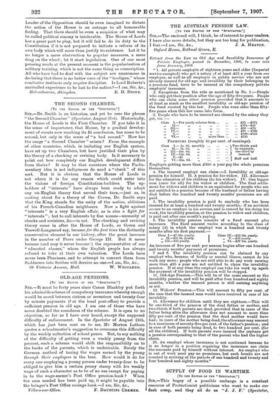THE AUSTRIAN PENSION LAW.
[TO THE EDITOR OF Till "SPECTATOR.") SIR,—The enclosed will, I think, be of interest to your readers.
I have also more details, but they are too long for publication,
I fear.—I am, Sir, &c., J. A. HEATON. Oxford House, Bethnal Green, E.
Extract from the Law OE Old Age and Invalidity Insurance of Private Employes, passed in December, 1906, to come into force January, 1909.
"1. All private employes of eighteen years and older (Imperial service excepted) who get a salary of at least .225 a year from one employer, as well as all employes in public service who are not already insured for old age and invalidity by their belonging to a pensions fund, have to be insured at the compulsory private employes' insurance.
2. Exceptions from the rule as mentioned in No. 1 :—People who only get their position after the age of fifty-five years. People who can claim some other pension provided that it amounts to at least as much as the smallest invalidity or old-age pension of the fund created by this law. People who were older than fifty- five years when this law came into force.
3. People who have to be insured are classed by the salary they get, viz. :— Class „ „ „ „ „ I.—For yearly salaries from ... ... II.— „ „ „ ... ...
IV.— „ „ „ ... ... V.— „ „ ...
VI.— „ „ more than ...
... £25 —£.371 ... £311—E50 £50 —L75 ... £75 –1O0 ... 2100-5125 ... 2125
PREMIUMS (roughly 10 per cent. of earnings).
1 Class I.— 5s. Od. monthly ... ... ... Two-thirds paid „ II.— 7s. Cd. ,, .., ... ... by employer, „ III.-10s. Od. „ ... ... ... one-third by „ IV.-15s. Od. „ ... ... ... insured. „ V.—L1 " — — — 1 Half and half.
Employes getting more than £300 a year pay the whole premium themselves.
4. The insured employe can claim :—L Invalidity or old-age pension for himself. II. A pension for his widow. III. Allowance for the education of his children (to his widow), IV. One bigger sum (once for all) for his widow or children. The final settle- ment for widows and children is an equivalent for people who are not entitled to a pension because of the husband or father having died before the hundred and twenty months' premiums are all paid.
5. The invalidity pension is paid to anybody who has been insured for at least a hundred and twenty months; if an accident occurs to an employe in his service, and is caused by his doing his work, the invalidity pension, or the pension to widow and children, is paid out after one month's paying.
6. The invalidity pension consists of a fixed amount plus increases. The fixed amount varies according to the class of salary (3) in which the employe was a hundred and twenty months after his first payment :— Class I.—E7 10s. yearly. I Class IV.-222 10s. yearly.
„ II.—£11 5s. yearly. ,, V.—E30 yearly. „ III.—X15 yearly. „ VI.—£37 10s. yearly.
An increase of five per cent, per annum begins after one hundred and twenty months' payment of premiums.
7 and 8. The invalidity pension can be claimed by any employe who, because of bodily or mental illness, cannot do his work any more : people who are still able to do any work earning more than £25 a year are not entitled to claim the invalidity pension. If at any time the employe can take his work up again the payment of the invalidity pension will be stopped. 11. Old-Age Pension.—This will be of the same amount as the invalidity pension, and will be paid after four hundred and eighty months, whether the insured person is still earning anything or not.
12. Widows' Pension.—This will amount to fifty per cent. of the sum that the insured man would have received in case of his invalidity.
15. Allowance for children until they are eighteen.—This will be one-third of the pension of the dead father or mother, and two-thirds if both parents are dead, provided that in cases of the father being alive the allowance does not amount to more than fifty per cent. of the pension that the dead mother would have had; in cases of the mother being dead, the allowance may amount to a maximum of seventy-five per cent, of the father's pension; and in case of both parents being dead, to two hundred per cent. (for all the children). If both parents were insured the orphans get a pension corresponding to that of the parent who had the higher claim.
25. An employe whose insurance is not continued because he is no longer in a position requiring the insurance can claim the amounts paid by himself without interest. An employe who is out of work need pay no premiums, but such breaks are not counted in arriving at the periods of one hundred and twenty and four hundred and eighty months."






































 Previous page
Previous page